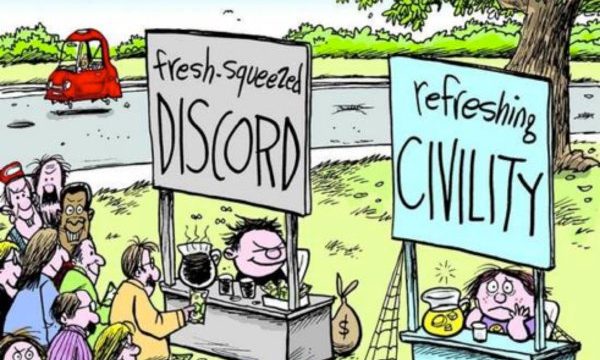Rod St. Aubyn: Is Civil Political Discourse Extinct?

I have become rather disenchanted with the “mean spiritedness” that is exhibited in the political world today, especially at the federal level. It is no wonder that the public holds such a low opinion of Congress these days. When I offer my criticism, it is not centered at any one party, but instead the entire political system at the national level. Let me go through just a few examples below:
- Former Speaker Nancy Pelosi goes on a rampage breaking congressional protocol wagging her finger and yelling as she crosses the political aisle chastising a Republican Congressman while he speaks on the House Floor.
- A Republican Congressman yells out “You lie” to President Obama as he is delivery a Presidential speech in Congress.
- Any criticism of the President by Republicans is met with allegations of racism by the President, Attorney General Eric Holder, and Democratic leaders.
- The political discord has gotten so bad that a man from Oklahoma has been charged with threatening to kill Senate Majority Leader Harry Reid.
- Hundreds of House Bills are languishing in the Senate with no Senate action after having been approved by the House, many with Democrat House sponsors and several with bipartisan support.
I could list many, many other examples as well. I question how we got where we are today in this toxic political environment. Happily I have not noted much of this happening in North Dakota – yet.
Exactly what does politics mean? Going on-line I found the following definition.
“Politics is the societal means of compromise, especially as applied to government. It is the collective decisions on authority and law as decided by a group or assembly. The term originates with the “affairs of state” defined by Aristotle in his treatise on government (Greek politika from polis “city”) around 350 BC.”
I underlined what I think in a key factor – that being “compromise”. In the world of politics, compromise must occur at times for the greater good and to get some things accomplished. Does this mean that you have to disregard principles? Absolutely not. In fact, principles should be what make up the key components of political parties. But to get things accomplished, it sometimes requires statesmen and stateswomen to find some middle ground. Neither side may get exactly what they want, but at least something can be done that all sides agree to and the public finds benefits in the compromised decision.
Right now, both Republicans and Democrats seem to be reluctant to let either side “win”, so little is accomplished. President Obama campaigned that he could work with both sides of the aisle and he was going to Washington to get things done. Yet, when he does not get exactly what he wants, he publically criticizes and chastises the Republicans. Where is the compromise? Recently I heard the President
complaining about some important legislation and that both parties could agree on 80% of the bill, but the Republicans would not agree. So does the President think that even though everyone agrees with most components of a bill that the Republicans should cave in and accept the 20% that they don’t agree on? Would he feel the same way if the roles were reversed and it was the Democrats that opposed the 20%. Personally I don’t know if I agree that 80% of the bill was agreed upon, however if that is true why didn’t the President have the leaders just draft a bill with only that 80% that everyone can agree on?
Unfortunately I have never seen our nation more divided than what I see now. Partisan politics has been around forever and is NOT a bad thing. Debate is good and sometimes it results in that ever needed compromise. Former Democrat Speaker of the House Tip O’Neill and President Reagan were both fierce competitors and resulted in several government shutdowns. But one thing that was prevalent is that they remained close friends, even sharing beers together on numerous occasions. It never got personal.
That is one thing that I note that has changed in politics today, primarily in Washington, but occasionally in ND as well. Political attacks are becoming more and more “personal” attacks. I witness it as well even on this blog. Personally I don’t like the anonymous nature of the blog submittals. I think if the bloggers would have to print their own real names, the comments would be much less offensive. I understand Rob’s and other’s rationale for the need for that, but I think it also contributes to the “nasty comments” and personal attacks at time. I am very uncomfortable with the comments like “libtards” and references to Rob being a “hack’. The bloggers making these comments often have very legitimate points and these could just as effectively be made without the personal attacks.
Can this toxic political environment in Washington change? I hope so. Will we see it replicated in ND? I hope not. I pray that civil political discourse does not become extinct.




